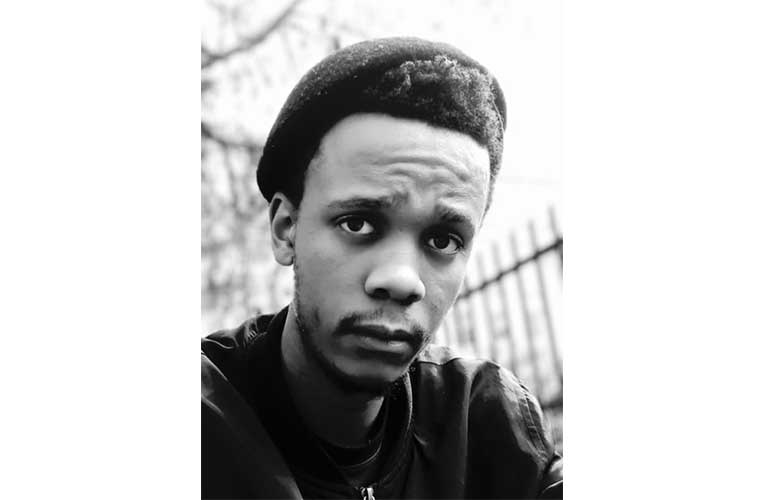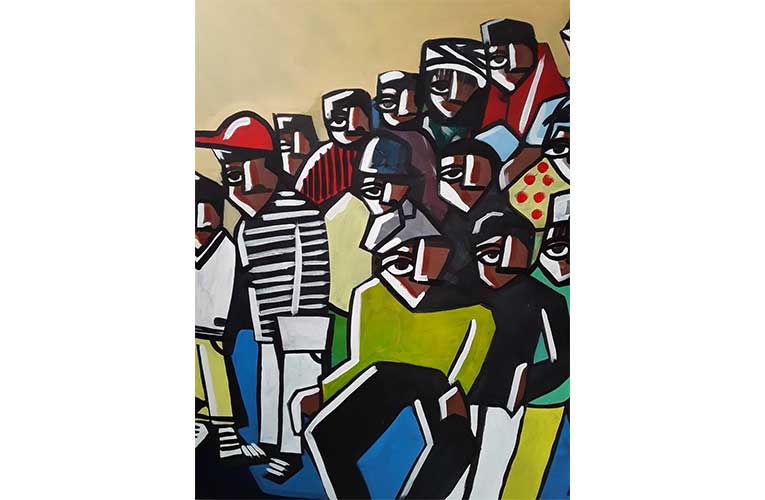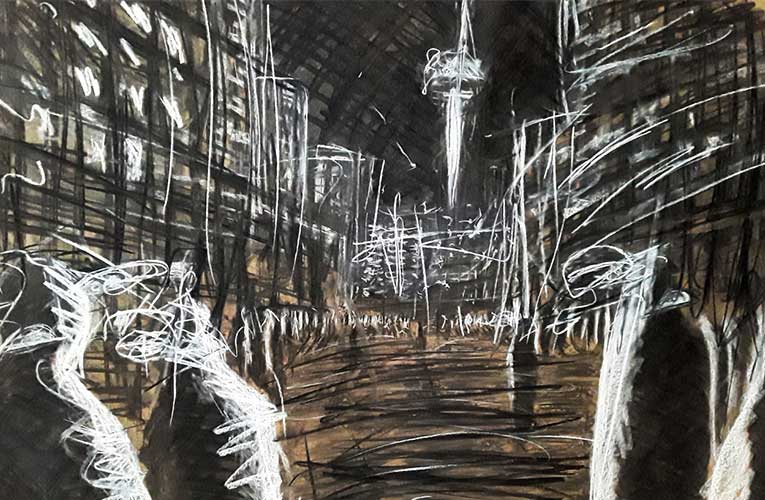Visual artist Levy Pooe documents the lives of the underdog in urban spaces
The winner of the Cassirer Welz Award for 2021 has a solo exhibition titled Mphe Mphe Ya Lapisa February 20 –March 12, 2021 at Bag Factory, Johannesburg
By Edward Tsumele
This week as I made my way to Newtown from Maboneng, where I live, walking on Main Street westwards, I noticed a snaking queue of mainly dejected looking people at the eastern side entrance of the Carlton Centre in Central Johannesburg. The time was 10.30am, and If I by now I was not used to such a queue at this place, which began ever since government announced the special Covid-19 grant for the unemployed, this clearly would have been an unusual sight. Not anymore. Those queuing are mainly young men and young women, out of work, and will probably be in that situation for a long time to come, thanks to Covid-19, which has resulted in more than 4 million jobs knocked off the South African economy ever since. The young men and women of working age, are here to try and get ahead of each other, getting into the post Office to get their hands on the R350 Covid-19 grant.
The R350 government grant is well meant, as this is what makes all the difference in certain sections of society’s demographics between hunger, and possibly starvation to death, and living. It sounds far- fetched but that is a daily reality for many households in the country.

For such young men and women, reduced to a sorry state of having to rely for their survival on government hand outs, the last thing under those dire circumstances they have to think about is their indignity of being watched pitifully by the passing public, as their desperation is all out there for all to see. I wondered how that must feel for such people, fit and healthy, but driven to such levels of despair and desperation that they have to publicly queue for the whole day for only R350, just to survive.
Social Issues such as the desperation of the people I have just seen in fact form a big portion of the themes of visual artist Levy :Pooe, the artist I was going to interview at the Bag Factory in Newtown.
“I sometimes wonder, and I have to be careful, how I say this –whether going to university to get that degree is any longer a guarantee that one will get a job. Unfortunately among the unemployed are to be found the youth,” Poe tells me in an interview ahead of the opening of his exhibition titled Mphe Mphe Ya Lapisa on Saturday, 20 February 2021.
Poe is the 2020 winner of the prestigious annual art prize, the Cassirer Welz Award, which is organised by fine art auction house Strauss &Co, in collaboration with the famous artist studio Bag Factory.
Because Pooe is the brand new winner, he has to present a solo exhibition that he has been working on since he was declared the winner last year.

And because the artist is fond of documenting city life, chronicling everyday happenings in urban spaces as people grapple with a city life that is often hostile to those less fortunate, he has decided to expand his focus on such issues by using the resources, and the studio time, he was afforded by the Cassirer Welz Award, to explore more on these social themes in the past four months.
Such scenes as the one I saw at Carlton centre, are recurring themes in his art practice, and so are scenes of busking musicians on the streets of Johannesburg.
“When one walks through Newtown, Braamfontein and Maboneng, one is bound to see musicians performing for momey. And yes, they perform because they are practising their God-given talent. But they also perform because they have to earn a living for their family. In a way I like that,” says Pooe, who himself is a fan of music.
In fact If one did not know that he is actually a visual artist, one would mistake him for a musician because If he is not in his home studio working, he is mostly in the company of musicians around the city.
“I also like painting and drawing musicians while they are performing live. That in a way stretches someone’s style because you will be dealing with a live show where there is an audience and you only have one hour to do your work. Even though these days I am no longer doing that kind of work as often as I used to do, for example, going as far as Grahamstown at the National Arts festival, I love that kind of work,” he said.
The body of work that he is presenting at the Bag Factory gives one an insight into Johannesburg’s social life, and how diverse it is, just like the complexity of the society from which the social life emanates.
For example, in this body of work, there is a piece that shows the cultural and social complexity of South Africa. This piece is a classic interpretation of the levels of inequality in this country. It is a piece that juxtaposes two groups of people in two sections, the wealthier class is seen enjoying good food and expensive drinks in a well spaced part of a venue, while the other section is occupied by a crowd so close to each other that they are literally breathing on each other’s necks and it is hard to imagine how they are even able to enjoy their not so expensive drinks under those conditions. Both groups seem to be at a concert of sorts. This kind oif scene so well captured by Poe is scary during this time of Covid-when social distancing is supposed to be the norm, In a way this piece is demonstrating that social distancing is a distant idea to those less privileged, and therefore it is the privileged that have the luxury to social distance.
“The issue of VIP status and how obsessed society is about that privilege is a well known South African high society culture. Someone will fight to death to be accorded VIP status at events. But the irony of the whole thing is in some cases, the most exciting part of the event is among the general public as the VIP section is often boring because the people there behave in a certain way, and are stiff because they fear being judged in that section, whereas the public are generally happy and more freer,” Pooe tells me.
Mphe Mphe Ya Lapisa, a solo exhibition of new work by Pooe, is an extension of Pooe’s ongoing themes that revolve around his relationship with the urban space, black narratives and the subtleties and enormities of black struggles in the city.
Mphe Mphe Ya Lapisa, motho o kgona ke sagagwe is a seTswana idiom, which can be translated as: “The constant act of asking is tiring. It is better to have your own.”
Mphe Mphe Ya Lapisa emerges from navigating the socio-economic condition and the deepening class disparity in our everyday experiences of being black in post-liberation South Africa. From enduring the long wait for the R350 social grant to passionately playing the flute in the street for the nonchalant passerby who sometimes offers neither money nor appreciation, Mphe Mphe Ya Lapisa gives meaning to the universal experience of how we see ways of asking, and how we become victims to this state of being. This theme poses questions such as but not limited to: What do we ask for? When do we ask? Who do we ask? From which spaces do we ask? In addition, this theme further calls us to interrogate the oppressive nature of being in a continuous state of lack as well as how this state further compromises our dignity, our bodies, our voices, and our autonomy.
Taking the artist’s relationship with the city of Johannesburg as a source of inspiration, the acrylic paintings and charcoal drawings presented interpret the theme in various ways. The subtle and mellow work Praying for Employment interrogates the different situations that the youth in South Africa find themselves in and the ways in which they navigate the pressures of not being upwardly mobile in a city that thrives on affluence and materiality. Kopa ungfake VIP (please get me into VIP) highlights the core message of this theme as it depicts the ways in which we navigate social mobility by constantly begging for a place in high-end spaces. Busking in the city takes the viewer on a walk through the city, which recognises the street musicians and how their melodies define their silences and struggles, as well as how they ask to be heard.
About the artist
Pooe born. 1994 is a seTswana speaking South African visual artist born in Rustenburg during the country’s transition to democracy. He is currently based in Johannesburg. Working in a range of mediums from painting, charcoal and collage to photography, Pooe is passionate about telling stories and creating narratives that speak to the urban black experience. He mostly works from his home studio, produces murals, and creates live interpretations of musical performances. Pooe studied towards a BAFA at University of the Witwatersrand (incomplete) and attended the Market Photo Workshop.










